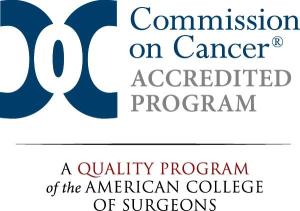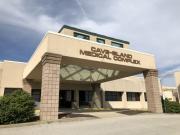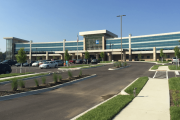Kidney Cancer

If you or a loved one is diagnosed with kidney cancer, you want expert, compassionate care. That’s why our cancer specialists work hard every day to make sure you can find it close to home. We’ll work with you—and with one another—to develop a treatment plan personalized to your condition, personal preferences and overall health. And as an accredited Comprehensive Community Cancer Program, we offer nearly all the same options and technology you’d find at an academic medical center.
What is Kidney Cancer?
The kidneys turn waste into urine, which leaves the kidneys through tubes called ureters and travels into the bladder, where it’s stored until it’s emptied from the body. The organs also make hormones that help control blood pressure and ensure the body has enough red blood cells.
Kidney cancer, which is one of the most common types of cancer in both men and women, develops when cells in the kidneys—the bean-shaped organs responsible for removing waste from the body—begin to grow out of control.
Kidney Cancer Symptoms
Most of the time, early kidney cancers don’t cause symptoms, but larger tumors often do. Common symptoms of kidney cancer include:
- A lump on the side or low back
- Anemia
- Blood in the urine, called hematuria
- Fatigue
- Loss of appetite
- Low back pain on one side
- Unexplained fever that won’t go away
- Unintentional weight loss
Kidney Cancer Risk Factors
A risk factor is something that increases your risk for developing a certain type of cancer. Some, like those related to genetics, you can’t change. But others, like risk factors related to lifestyle, you can.
Common risk factors for kidney cancer include:
- Advanced kidney disease
- Certain inherited conditions, such as von Hippel-Lindau disease, Cowden syndrome and tuberous sclerosis
- Family history of kidney disease
- Gender
- High blood pressure
- Obesity
- Tobacco use
- Workplace exposures to harmful chemicals like trichloroethylene
Kidney Cancer Types
There are several types of kidney cancer, including:
- Renal cell carcinoma, or renal cancer, starts in the cells that line the kidney’s tubules, which are the tiny tubes that return nutrients and fluids to the blood, and typically develops as a single tumor in one kidney. Renal cell carcinoma is the most common type of kidney cancer.
- Renal sarcoma, which is the least common form of kidney cancer, begins in the connective tissues of the kidneys.
- Transitional cell cancer begins where the ureter connects to the kidney.
- Wilms tumors are most common in children.
Diagnosing Kidney Cancer
If you have symptoms of kidney cancer, we may recommend certain tests to help us diagnose or rule out the disease. Most often, we’ll begin by reviewing your complete medical history and conducting a physical exam. After that, we may recommend:
- Blood tests to see how many red blood cells are in your body. If there are too few, you may have anemia, which can be a risk factor for kidney cancer. We also may check your kidney cancer function by looking at your creatinine level, which is a waste product that can build up in the blood if your kidneys aren’t working as they should.
- Imaging tests to look for kidney cancer, such as CT scan, MRI and ultrasound.
- Kidney biopsy to diagnose kidney cancer, we’ll take a small sample of tissue from the kidney to test for disease.
- Urinalysis involves sampling the urine for evidence of blood.
Treating Kidney Cancer
Your cancer care team may include medical, surgical and radiation oncologists, as well as supportive care clinicians, such as dietitians, counselors and nurse practitioners.
In general, kidney cancer treatment may include:
- Ablation can be used for patients who are too sick to have surgery or don’t want surgery. Typically, we’ll use radiofrequency ablation (RFA), which uses high-energy radio waves to heat and destroy the tumor.
- Active surveillance for cases that require a watch-and-wait approach. We’ll do this for patients with small kidney tumors and carefully watch to see if the cancer grows.
- Chemotherapy often isn’t a good option for patients with kidney cancer. However, we may use it to treat certain patients, including those whose cancer isn’t responding to other treatments.
- Genetic counseling can help you and your family understand your inherited risk of cancer. Our genetic counselor can coordinate genetic testing and determine what screenings and preventive techniques would benefit you.
- Immunotherapy may be recommended to target checkpoint proteins—which kidney cancer cells sometimes use to avoid attack by the immune system—and activate the immune response.
- Radiation therapy to treat kidney cancer if someone isn’t healthy enough to have surgery or only has one kidney.
- Surgery, which is generally the main treatment for most kidney cancers. Often, it can be used to completely remove the cancer. We may also use it to remove the adrenal gland, nearby lymph nodes and fatty tissue around the kidney.
- Targeted therapy to help shrink or slow the growth of kidney cancer. We also may use these drugs after surgery, as continued treatment for people who have a high risk of the cancer returning.






















